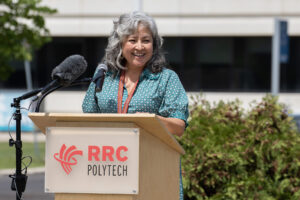



RRC Polytech is dedicated to transforming spaces, bridging cultures, and fostering stronger relationships between Indigenous and non-Indigenous communities. Our goal is to be the top choice for Indigenous learners across Manitoba and beyond.
At the core of reconciliation are trust, respect, and inclusion. Our evolving strategy focuses on education, curriculum development, and community engagement. Through industry partnerships, we ensure Indigenous students transition to culturally inclusive workplaces.
Indigenous Strategy, Research, and Business Development continues to explore new ways to integrate industry into our educational models.
Reconciliation is a shared responsibility. By working together, we can move forward together that’s mutually beneficial to all peoples.
Truth and Reconciliation and Community Engagement is a key component of Indigenous Strategy, Research and Business Development, and leads RRC Polytech in achieving its second strategic commitment: Commit to Truth and Reconciliation and pursue equity, diversity, and inclusion in everything we do.
Truth and Reconciliation and Community Engagement began its work in 2018 has since created countless opportunities for the College to actively engage in learning Canada’s true history, while incorporating Indigenous perspectives through the Truth and Reconciliation Commission’s 94 Calls to Action as a foundational framework.
RRC Polytech campuses are located on the lands of the Anishinaabeg, Ininiwak, Anishininwak, Dakota Oyate, and Denésuline, and the National Homeland of the Red River Métis.
We recognize and honour Treaty 3 Territory Shoal Lake 40 First Nation, the source of Winnipeg’s clean drinking water. In addition, we acknowledge Treaty Territories which provide us with access to electricity we use in both our personal and professional lives.